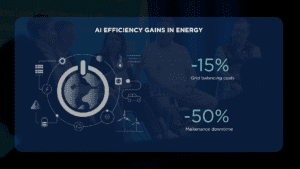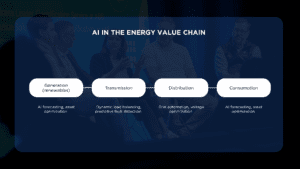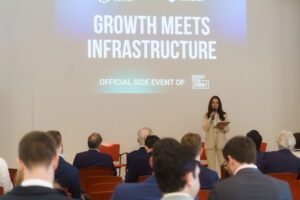Artificial intelligence in energy and utilities is moving fast. Once dismissed as hype, AI is now being deployed in real-world systems to manage grids, optimize storage, and improve demand forecasting. At the same time, AI workloads themselves are fueling unprecedented growth in computing and data infrastructure – putting new pressure on energy systems.
AI for Energy Efficiency and Grid Optimization
From AI in renewable energy integration to smarter grid balancing, the potential for efficiency gains is enormous. At Energy Tech Summit 2025, Ingrid Capacity and SET Ventures highlighted how digitization allows real-time monitoring and automated power distribution – reducing waste and improving reliability.
Utilities like Exnaton are already deploying platforms that cut legacy inefficiencies and bring real-time intelligence into billing and operations. These are not pilot projects; they are operational systems proving how AI in the energy industry is maturing.

AI-driven forecasting can reduce grid balancing costs by up to 15% (IEA, Digitalisation & Energy), while predictive maintenance can cut downtime by as much as 50% (PwC, Sizing the Prize). These efficiency gains highlight the tangible impact of artificial intelligence in the energy sector.
AI in the Energy Value Chain: From Renewables to Consumption
AI’s role extends across the entire energy value chain – from forecasting wind and solar output, to balancing transmission loads, to empowering consumers with real-time efficiency insights.

From generation to consumption, AI enhances every layer of the energy system. It improves renewable forecasting (+5–10% utilization, World Economic Forum), automates transmission grids (−10–15% balancing costs, IEA), reduces downtime (−30–50%, PwC), and enables smarter energy use at the consumer level.
Scaling AI: From Energy to Compute
But here’s the challenge: AI doesn’t run on thin air. Every application – from predictive grid analytics to demand-response optimization – requires compute capacity. And the surge in AI workloads is driving record demand for data centers, processors, and networking.
According to McKinsey report, global demand for data center capacity is set to grow 19–22% by 2030. This has direct implications for both the energy industry and the compute industry:
– AI models need hyperscale compute clusters with low latency
– Data centers must expand sustainably to avoid undermining net-zero goals
– Cooling, edge, and modular designs are becoming essential to efficiency
Energy Tech Summit 2026: Building on Global Momentum
The 7th edition of Energy Tech Summit (April 15–16, 2026, Bilbao) builds on a track record of convening leading corporations, startups, financial institutions, and investors across energy and climate tech. Confirmed companies include:
Google, Microsoft, AWS, Shell, ENGIE New Ventures, Fortum, Iberdrola, Octopus Energy, ABB, SAP, JP Morgan, Morgan Stanley, Bank of America, UBS, and more.
This ecosystem makes the Energy Tech Summit one of the most influential stages for energy innovation in Europe. Now, the same formula is being applied to compute infrastructure.

Delegates networking during Energy Tech Summit — one of Europe’s leading stages for energy and climate tech.
Compute Summit 2026: Where Compute Meets Energy
Spinning out of Energy Tech Summit’s “Growth Meets Infrastructure” track, Compute Summit 2026 (March 17–18, Barcelona) will address the new frontier: how hyperscale compute, AI acceleration, and sustainable energy strategy come together.
Themes include:
– Hyperscale strategy and global investments
– AI infrastructure and acceleration
– Compute optimization, cooling, and efficiency
– Data center design and operations
– Emerging compute technologies (photonics, edge, modular systems)
The audience spans hyperscalers, infra investors, co-location operators, big tech, and digital infra innovators – the people building the physical and digital backbone of AI.
Already confirmed attendees include: Dell Technologies, Equinix, Schneider Electric, KKR, UBS, J.P. Morgan, Santander, Morgan Stanley, IBM, Ferrovial, Ardian, I Squared Capital, and Virtus Data Centres – alongside regulators, energy companies, and innovators.

Growth Meets Infrastructure side event at Energy Tech Summit 2025, the precursor to today’s Compute Summit.
Conclusion
The intersection of AI and energy is no longer a distant vision. From AI in renewable energy to predictive analytics in utilities, the gains are tangible. Yet, scaling these breakthroughs depends on building sustainable, next-generation compute infrastructure.
The convergence of AI in renewable energy and compute infrastructure is reshaping how energy systems operate and how digital infrastructure scales. Capturing the benefits – lower costs, higher reliability, and accelerated decarbonization – depends on aligning these two domains.
👉 If you’re in the sector, don’t miss the chance to connect with peers, meet the industry’s decision-makers, and explore partnerships that will define the next decade.
Join the leaders shaping this future at Energy Tech Summit 2026 and Compute Summit 2026.
FAQ: AI in Energy and Compute Infrastructure
1. How is AI used in the energy industry today?
AI in the energy industry is already applied in renewable forecasting, predictive maintenance, and grid optimization. For example, AI-driven forecasting can reduce grid balancing costs by up to 15% (IEA), while predictive maintenance can cut downtime by up to 50% (PwC).
2. What is the role of AI in renewable energy?
AI helps integrate variable renewable sources like wind and solar into the grid more effectively. By predicting generation patterns and automating resource allocation, AI can increase renewable utilization by 5–10% (World Economic Forum).
3. Why attend Energy Tech Summit and Compute Summit?
These events gather the full ecosystem—energy companies, hyperscalers, investors, big tech, policymakers, and startups. Energy Tech Summit 2026 (Bilbao) focuses on energy and climate innovation, while Compute Summit 2026 (Barcelona) tackles compute power, AI infrastructure, and sustainable digital systems. Attendees gain access to decision-makers, curated networking, and the latest innovations driving the sector.
4. Where can I buy tickets for Energy Tech Summit or Compute Summit?
You can secure your place directly on the official websites: Energy Tech Summit tickets and Compute Summit tickets. Early booking is recommended for discounted rates and guaranteed access to networking opportunities.


